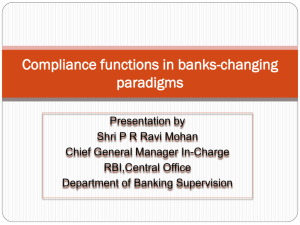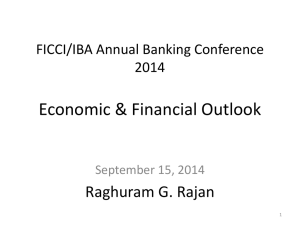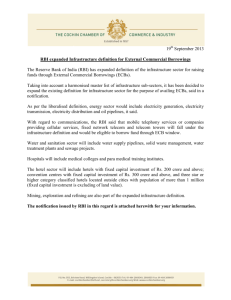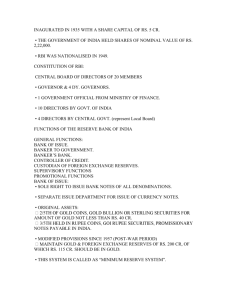23-2006
advertisement
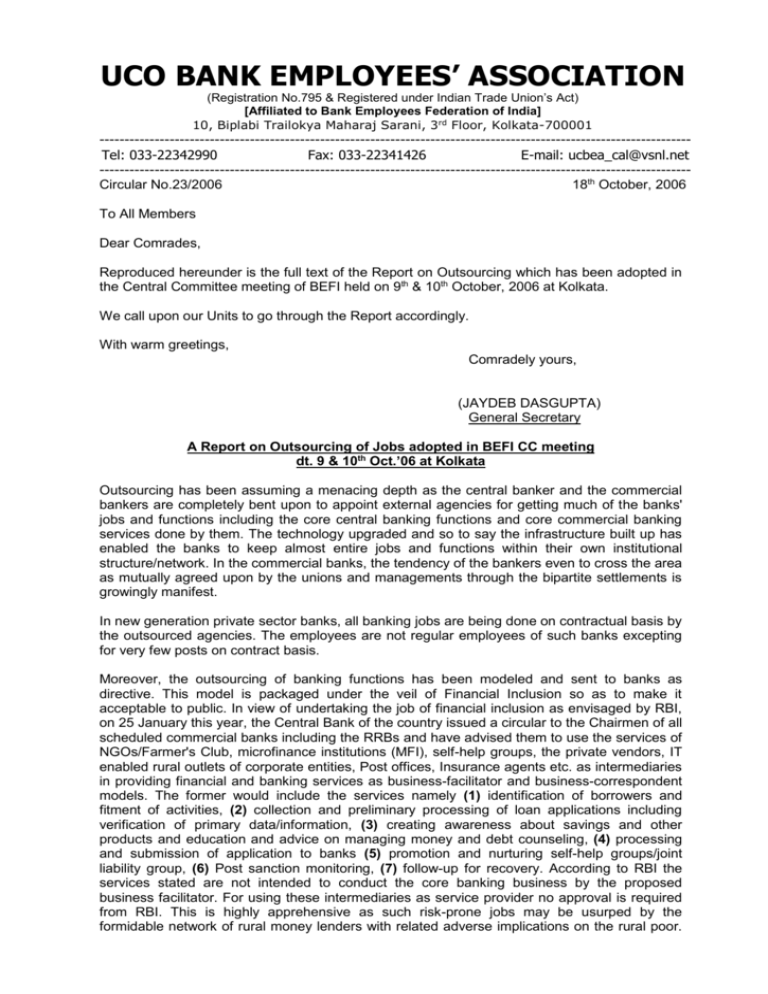
UCO BANK EMPLOYEES’ ASSOCIATION (Registration No.795 & Registered under Indian Trade Union’s Act) [Affiliated to Bank Employees Federation of India] 10, Biplabi Trailokya Maharaj Sarani, 3rd Floor, Kolkata-700001 ---------------------------------------------------------------------------------------------------------------------Tel: 033-22342990 Fax: 033-22341426 E-mail: ucbea_cal@vsnl.net ---------------------------------------------------------------------------------------------------------------------Circular No.23/2006 18th October, 2006 To All Members Dear Comrades, Reproduced hereunder is the full text of the Report on Outsourcing which has been adopted in the Central Committee meeting of BEFI held on 9th & 10th October, 2006 at Kolkata. We call upon our Units to go through the Report accordingly. With warm greetings, Comradely yours, (JAYDEB DASGUPTA) General Secretary A Report on Outsourcing of Jobs adopted in BEFI CC meeting dt. 9 & 10th Oct.’06 at Kolkata Outsourcing has been assuming a menacing depth as the central banker and the commercial bankers are completely bent upon to appoint external agencies for getting much of the banks' jobs and functions including the core central banking functions and core commercial banking services done by them. The technology upgraded and so to say the infrastructure built up has enabled the banks to keep almost entire jobs and functions within their own institutional structure/network. In the commercial banks, the tendency of the bankers even to cross the area as mutually agreed upon by the unions and managements through the bipartite settlements is growingly manifest. In new generation private sector banks, all banking jobs are being done on contractual basis by the outsourced agencies. The employees are not regular employees of such banks excepting for very few posts on contract basis. Moreover, the outsourcing of banking functions has been modeled and sent to banks as directive. This model is packaged under the veil of Financial Inclusion so as to make it acceptable to public. In view of undertaking the job of financial inclusion as envisaged by RBI, on 25 January this year, the Central Bank of the country issued a circular to the Chairmen of all scheduled commercial banks including the RRBs and have advised them to use the services of NGOs/Farmer's Club, microfinance institutions (MFI), self-help groups, the private vendors, IT enabled rural outlets of corporate entities, Post offices, Insurance agents etc. as intermediaries in providing financial and banking services as business-facilitator and business-correspondent models. The former would include the services namely (1) identification of borrowers and fitment of activities, (2) collection and preliminary processing of loan applications including verification of primary data/information, (3) creating awareness about savings and other products and education and advice on managing money and debt counseling, (4) processing and submission of application to banks (5) promotion and nurturing self-help groups/joint liability group, (6) Post sanction monitoring, (7) follow-up for recovery. According to RBI the services stated are not intended to conduct the core banking business by the proposed business facilitator. For using these intermediaries as service provider no approval is required from RBI. This is highly apprehensive as such risk-prone jobs may be usurped by the formidable network of rural money lenders with related adverse implications on the rural poor. The latter as envisaged by RBI will also include registered NBFCs not accepting public deposits and post offices. The business correspondents as termed by RBI will also undertake the activity, such as (1) disbursal of small value credit, (2) Recovery of principal/collection of interest, (3) Collection of small value deposits, (4) Sale of micro insurance/mutual fund products/pension products/other third party products and (5) receipt/delivery of small value remittances/other payment instruments. To-day outsourcing is increasingly used as a means of reducing cost and maximizing profit. The potential impact can be seen all over the world across many business activities, including IT (application, development, programming, coding) specific operations (various aspects of finance and accounting, back office activities, processing and administration) and contract functions (e.g. call centres) etc. The outsourcing institute of USA has conducted a survey of various companies and organizations on their outsourcing practices. The report (30 March 2004) presented to the Board of Governors of the Federal Reserve System captioned as 'offshoring and cross-border outsourcing by banks' estimated that 356 billion U.S. dollars of the U.S. financial industry services would be outsourced. This huge amount is only 15% of the industry's cost base. A flow from high-wage to low-wage is the universal feature. Bank for International Settlement (BIS) under the auspices of last year a joint exercise by international committees like Basel Committee on banking supervision (BCBS), the International Association of Insurance Supervision (IAIS) and the international organization of securities commission (IOSCO) on outsourcing of financial services was made. They could not ignore the key issue emerging as insufficient controls and checking mechanism between the third party provider and the institution to debilitate the age-old customer relations and the business profile of the banks in a realm of cut-throat competitiveness. In a case study it was found that in Germany, a credit institution wanted to outsource not only the servicing of loans, but also the decision to grant a loan. The result of the assessment by the supervisor was that the credit institution was unable to monitor and oversee the loans granted by the loan factory (un-regulated service provider to whom credit institutions outsource the loan handling). Interestingly, the business is run by the credit institution which bears the risk emerging from it, the decision on granting the loans had been made by the service provider. In another case the office of the Comptroller of Currency in the USA took enforcement action against a Californian bank and a third party service provider to the bank on the charge of failure to exercise sound oversight. There are uncountable examples. Regarding the motives for outsourcing, apart from Joint Forum's survey, the survey of European Central Bank 2004 too admitted that cost reduction is the basic motive which prompts the industries to go for outsourcing. There are other reasons also. There is wide spread outsourcing of vital functions of RBI too. However, the context of outsourcing of the Central banking functions is not the cost factor. Consequent upon the policy of financial sector liberalization, the role of RBI as a central bank in monetary management of the country and its role as 'banker of the banks' are being redefined. The monetary management which is core area of functioning of RBI have been set to undergo changes at the behest of global operators (WB/IMF) .Needless to mention, the concept of supervision over banking and non-banking financial activities or foreign exchange management shall have to incorporate necessary changes so as to allow the market instruments operate efficiently in the financial sector of the liberalized economy. Revealingly, target is to disarm RBI so that it cannot intervene properly as the crisis mounts up in the economy. RBI, as the central bank of the country is duly assigned to perform the core central banking functions like monetary management, currency management, foreign exchange management, regulation and supervision of financial system, payment and settlement system, Banker to banks, Banker to Govt., Public debt management and spectacularly its developmental role. But it is gradually withdrawing itself from the historically assigned role. In such style of outsourcing of jobs and functions coupled with abdication of central banking role, RBI very often advances a logic of "conflict of interest". The Report on trend and progress of banking in India says, "A well functioning payment and settlement system is crucial for successful implementation of monetary policy and maintaining financial stability". Now, conduction of monetary policy and role of fiscal responsibility are the functions of RBI. Hence, payment and settlement system being a crucial role for a central bank should within RBI as hitherto with all operations related thereto. In a note given to parliamentary standing committee of finance RBI has admitted that an enormous progress has been achieved by RBI in modernising and expanding the payment system. SBI has already built up the back up system. Some other banks are also in a position to build up system and provide staff, because they are quite big. They are always amenable to guidelines and instructions issued by RBI. However, newly created Board for regulation and supervision of payment system (BPSS), Department of Payment & Settlement System (DPSS) with a technical committee inside RBI with its experience and expertise can very well facilitate uniformity in structure, operation and procedures of extant system of clearing operation. For this there is no need of any new entity, what is required is to strengthen and appropriately empower BPSS and DPSS to enable them to undertake the work effectively. Only very recently noted economist Dr. Amiya Bagchi has commented, "I shudder to think what might happen with the proposed outsourcing of cheque clearance operations. You cannot trust people's money to virtually unregulated private organisations". He also said, “It cannot outsource some of the basic functions of a central bank to a private body in a country like India where we have enough experience of how private banks and private bodies of other' kinds have played drakes and ducks with people's money”. There is a definite move of the vested quarters inside and outside to bring RBI out of the accountability of the parliament and make it an independent monetary authority. Obviously this is difficult. Hence, outsourcing of role and functions are in the agenda to dismantle the Central Bank of the country. Under the circumstances the PSBs and other commercial banks are in the process of opting for outsourcing of the following jobs: 1) 2) 3) 4) 5) 6) 7) 8) 9) 10) Mobilisation of deposits and opening of S/B Account etc. Cash remittance from branch to chest and from chest of RBI. Marketing of products like Credit Card, Loan etc. Filling cash in ATM through private vendors. Listing of clearing cheques, balancing of Books & Registers etc. in various branches in different centres. Installation of computer system with the help of private agencies, development of software packages, management of computer related problems. All kinds of despatching job including cheques pertaining to inward clearing, outward clearing by engaging Courier service. Security and armed guard arrangement of branches/ ATMs. Maintenance of branch premises/cleaning and sweeping of bank branch offices. Outsourcing of submission of returns on TDS. The trade unions of RBI and commercial banks and financial sector must try to mobilise the people at large, the parliamentarians, members of State Legislatures, the trade unions, mass organisations, economists, experts, intellectuals and thinkers in this great fight against outsourcing of commercial banking services and core central banking functions for the greatest interest to save our economy and people from impending disaster. We happily note that outsourcing and recruitment have already become vital issues to all the central trade unions of the country. In banking sector, this issue of recruitment has to be further emphasised and make a live issue for bank employees' struggle. These are main issues on which working class will go for strike on 14th December 2006. The issues of the trade union movement, if furthered properly, will soon be linked with the democratic movement. Anti- outsourcing movement, needless to mention, will be able to make a breakthrough if the movement gets closely linked with the movement of the vast unorganized sections of the masses who are in a grim struggle to improve their living conditions, wages and salaries. Several hundreds contract labours are already working in the banks, even in some sensitive areas. So far bank unions do not pay serious attention to them. It requires no mention that we must take a conscious decision to organise them and integrate them with general bank employees movement. Some beginning has been made in some banks. This issue is strategically linked with our struggle against outsourcing. We must be on the job right now.

